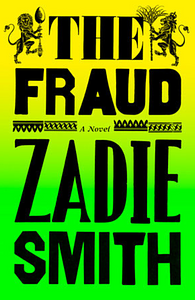Take a photo of a barcode or cover
DNF. I made a promise to stop reading books I didn't enjoy. This is my first DNF ever.
Honestly, I don't think Zadie Smith is for me, this is not the first novel by her that I didn't enjoy.
There just didn't seem to be any momentum in the story 30% in.
Honestly, I don't think Zadie Smith is for me, this is not the first novel by her that I didn't enjoy.
There just didn't seem to be any momentum in the story 30% in.
I have no idea what that book was about. Don’t know why I kept reading… maybe because I kept believing at some point it would all make sense?? It never did.
challenging
informative
fast-paced
Plot or Character Driven:
Character
Strong character development:
Complicated
Loveable characters:
No
Diverse cast of characters:
Yes
Flaws of characters a main focus:
Yes
informative
reflective
relaxing
slow-paced
Plot or Character Driven:
A mix
Strong character development:
Yes
Loveable characters:
No
Diverse cast of characters:
No
Flaws of characters a main focus:
Yes
funny
informative
reflective
medium-paced
Plot or Character Driven:
A mix
funny
informative
lighthearted
medium-paced
Plot or Character Driven:
Character
Strong character development:
No
Loveable characters:
No
Diverse cast of characters:
Yes
Flaws of characters a main focus:
Yes
... more and more these days she suspected that women ... could possess magnetic powers of attraction--above and beyond mere beauty--and that she might herself be such a woman, and that, moreover, there might be a deal more of such women than was commonly supposed (p. 346).
The Fraud is a historical novel, set during the early decades of the 1800s, and taking place mostly within the milieu of the literary 'scene' in London during that time. It has three main narrative threads: first and foremost, it is the story of Eliza Touchet, a widow, and cousin to the novelist William Ainsworth; second, a romping recollection of the Tichbourne claimant affair, including the court case it involved; and third, the story of a once-enslaved man, Andrew Bogle, much of which takes place in Jamaica. The first and second threads are interwoven throughout the book: the Bogle biography largely in a chunk about two-thirds of the way through, which protrudes into the novel like an iceberg, disrupting the narrative's English- and white-centric perspectives on the debates about slavery, trade, and abolition, as well as on the Tichbourne claimant.
The novel is organised into very short chapters--most a page and a half, to two pages long. This gives a strong sense of quickness to the reading experience, though the narrative doesn't have a strong sense of narrative momentum.
Eliza is a sympathetic and engaging narrator/character, though deeply flawed in ways that are rooted in her class, time, and limited perspective. These flaws (and those of her cousin/lover/companion) are keenly and even tenderly explored through the novel, which allows the reader to feel both 'on her side' in the narrative, and then to have the unsettling and rewarding experience of seeing her from another perspective/from outside her limited worldview. This is quite at odds with the way that we see her cousin, William, who is something of a ludicrous caricature of a popular novelist. Full of enthusiasms, prolific, sensitive and egoistic: a function, perhaps, of seeing him largely from Eliza's perspective.
Bogle, on the other hand, is a different kind of not-quite-flat character. He is drawn in three dimensions, eventually (mostly via the biographical chunk), but emerges still mysterious, noble, long-suffering, earnest.
These main characters are all based on historical figures, and many more historical figures of the time appear in the novels pages. Some of the more well-known to today's readers include Charles Dickens, William Thackeray, George Cruikshank and, of course, Roger Tichbourne (the so-called Tichbourne claimant). These famous men are drawn, mostly through Eliza's perspective, as only slightly less ridiculous and unappealing characters than William Ainsworth. There is something both delightful, and off-putting, about the skewering of these 'great' men of the past. It feels delicious and gossipy, but by the end of the novel I felt unsure why they were drawn in this way. To make them seem more human, perhaps? Less Great Historical Figures, and more squabbling, petty, grasping, manipulative, and ambitious men: echoes of the thousands of writers and would-be writers one rubs up against in the trenches of the writing and publishing industry.
The writing about writing is astute, incisive, and often funny.
The book invites you, in the end, to wonder (of course!) who is really the fraud of the title. The most obvious nominee is Roger Tichbourne, but almost every other significant character is also eligible for the title, including both Eliza, and Bogle.
On the whole, while the book lacks a strong sense of narrative momentum or, in the end, purposefulness, it's a delightful, playful, intriguing novel. Rich in historical detail. Full of bouncing, wicked, engaging zingers.
Worth reading for the playfulness, for the famous-folk-of-the-time-bingo fun, for the zingers regarding writing, gender politics, marriage and class, and for Eliza who is, in the end, a nuanced and complex portrait of a (white) woman of her time. Like Dorothea, of Eliot's Middlemarch, she is a woman who believes in her own potential to do something great, but is thwarted in achieving ... anything really ... by her sex and her class/wealth, but also by the limitations of her own ambition, and her critical insight.
informative
reflective
fast-paced
Plot or Character Driven:
Character
Strong character development:
Complicated
Loveable characters:
Complicated
Diverse cast of characters:
Yes
Flaws of characters a main focus:
Yes
challenging
dark
funny
informative
reflective
sad
slow-paced
Plot or Character Driven:
Character
Strong character development:
Yes
Loveable characters:
Complicated
Diverse cast of characters:
Yes
Flaws of characters a main focus:
Yes
Overall an enjoyable, but not compelling read. Stylistically I found the back and forth of past and present in very short chapters confusing at times, making the narrative harder to follow.
The historical subject matter and plain-talking about the horrors of slavery and its acceptance by society are timely and revealing. The book showed the material benefits from the slave trade for non-slaves and that some segment of society in England acted to end it.
I found myself looking up many of the mentioned historical episodes and personages to see that they occurred and gain context and understanding.
I couldn't quite figure out Bogle's rationale to support Sir Roger unless it was to support a fellow human also abused by society to gain something.
There are parallels of people willing to believe the unbelievable echoing current events in the US of a politician who will say anything without factual basis and having hordes who believe it or at least support it.
The historical subject matter and plain-talking about the horrors of slavery and its acceptance by society are timely and revealing. The book showed the material benefits from the slave trade for non-slaves and that some segment of society in England acted to end it.
I found myself looking up many of the mentioned historical episodes and personages to see that they occurred and gain context and understanding.
I couldn't quite figure out Bogle's rationale to support Sir Roger unless it was to support a fellow human also abused by society to gain something.
There are parallels of people willing to believe the unbelievable echoing current events in the US of a politician who will say anything without factual basis and having hordes who believe it or at least support it.
reflective
medium-paced
Plot or Character Driven:
Character
Strong character development:
Yes
Loveable characters:
Complicated
Diverse cast of characters:
Yes
Flaws of characters a main focus:
Yes






